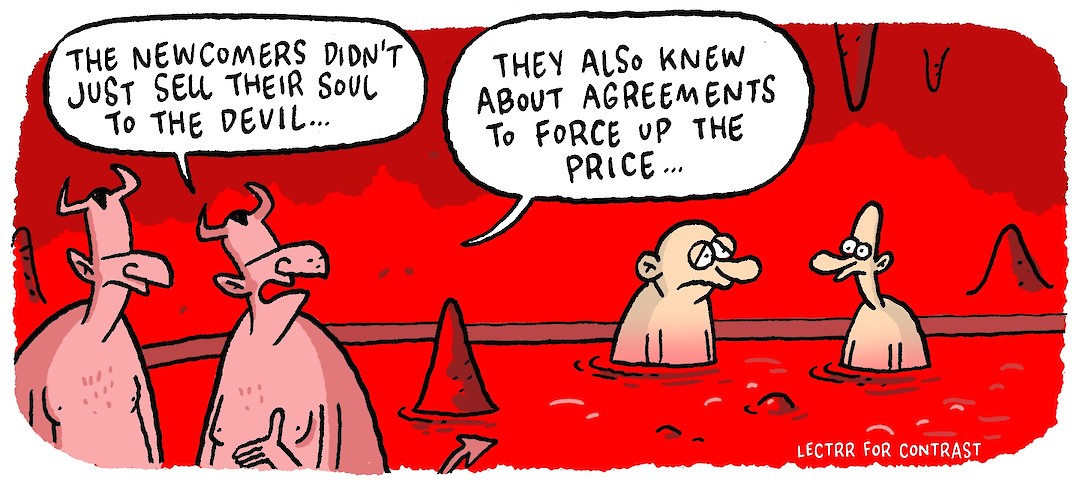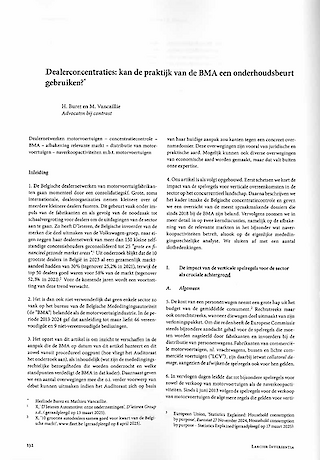In the Picture

Why silence is not always golden...
June 2015Imagine...
For years now you've represented your company in the meetings of a trade federation. Nothing especially exciting, but in the meantime the participants have formed a tight group, and that makes these get-togethers quite enjoyable. The general discussions about economic indicators and sector trends are punctuated by a lot of laughter. So the meetings have become more of a tradition; you don't really learn a lot of earth-shattering news in them.
At the last two or three meetings, Peter - who works for one of your competitors - has been acting a bit oddly, complaining repeatedly and at length about the "totally messed-up" price levels on the market. The scuttlebutt is that, due to poor results, he failed to get a bonus and might even be on the way out at his company.
Peter does have a point, however: things really aren't going well in the sector. The margins are under heavy pressure because raw material prices are rising, but customers are refusing to simply allow them to be passed on.
Peter speaks at the latest meeting as well. He says that he's under enormous pressure and has to do something. He confirms that, at the beginning of next month, his company will be raising all its prices by 8%, and he urges the others to seize this important signal in order to do the same with their prices. You know that this 8% isn't unreasonable: raw material prices alone rose by more than 8% last year.
Everyone looks at one another after this intervention. No one had expected such a proposal, and no one is authorized to confirm or deny anything whatsoever here on behalf of his company. The chairman clearly realizes that no meaningful discussion can be conducted on this, and he bridges the awkward silence by immediately moving on to the next agenda item.
Afterwards, Peter's intervention plays over and over in your head. Admittedly nothing was agreed, nor were any reactions even expressed, and yet...
A brief clarification.
Competition law strictly monitors agreements and contacts between competitors. Price agreements are regarded as being amongst the very worst violations: these are so-called "cartels".
However, the cartel concept is much broader. For example, it also includes the exchange of information on the intentions of a company with regard to its future prices. The fact that the companies which receive the information do not disclose their own price information, or do not adjust their own prices in accordance with the obtained information, is irrelevant. Simply receiving the information is in itself a cartel infringement.
Serious penalties for cartel infringements.
The competition authorities have the power to impose heavy fines for competition law violations. The fines of the European Commission can amount to 10% of the worldwide turnover at the group level of the financial year preceding the date of the European Commission's decision.
For cartels, the general point of departure is between 15% and 30% of the turnover on the market involved during the final year of the violation. This amount is multiplied by the number of years that the violation went on. The actual calculation incorporates other factors as well, but this point of departure already illustrates why the fines can run so high.
Moreover, cartel infringements can lead to other sanctions, such as personal fines for the individuals involved, and in some countries (but not in Belgium) even to prison terms.
Both the legislatures and the competition authorities consciously opt for sanctions that will have a powerful dissuasive effect. Moreover, the fact that a company may not have been making a profit for years isn’t regarded as relevant, and the fines are generally (also in Belgium) not tax-deductible.
Concretely.
In order to remain outside the competition law danger zone, you must do the following when a competitor provides sensitive information about the future commercial policy of his company (for example, on prices, volumes or the launch of new products):
- You have to object immediately and very expressly.
- If, despite your objection, the theme continues to be a topic of discussion, you should break off the conversation and if necessary leave the meeting.
- You must create a clear written trace of your objection, for example in the minutes of the meeting or in an e-mail that you send immediately afterwards (and which you carefully preserve).
- You should immediately contact your legal department or outside lawyer in order to report the incident.
These rules of thumb apply not only for federation meetings, but also for any other meeting and any other contact (by e-mail, text message, social media, telephone call, etc.) where the problem is posed. After all, any such contacts can come to light when a participant reports them to the competition authorities as part of cutting a deal, i.e. requesting immunity from or a reduction of cartel fines in exchange for cooperation with the authority.
The fact that you didn't react to the information, didn't take it into account or didn't report it internally in your company will not save you. Only a public distancing can ensure that your involvement in the meeting or in the contact afterwards will not be branded as "cartel participation".
Want to know more?
Oxford University Press has just published a monograph devoted entirely to cartels and other agreements amongst competitors: Horizontal Agreements and Cartels in EU Competition Law. This study was edited by contrast and contains contributions by top specialists from the European Commission (Directorate-General Competition and Legal Service) and from a national competition authority, the legal profession and economists.











